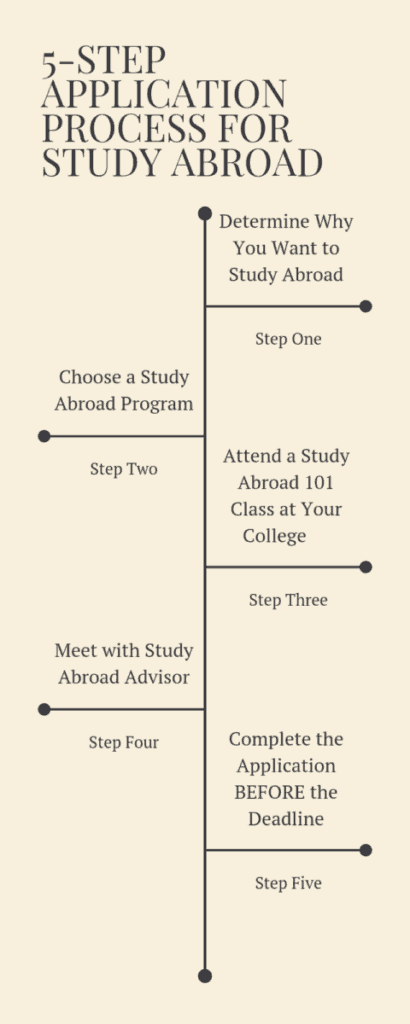
Remember all the forms you had to fill out when applying to colleges? And all those generic essays you BS’d your way through? Maybe you also had to kiss up to a teacher the day before you graduated to ensure you got a good letter of recommendation. Let’s not forget, there was a fee for every application too. If you are anything like me, you probably blocked that time in your life from your memory because of the stress it caused. Well, if you are interested in studying abroad, it’s time to dust off the cobwebs because you have to apply to at least one more program. So the money question is:
How Do I Apply to Study Abroad at My College? The 5-Step Application Process for Study Abroad is Pretty Basic: Determining Why You Want to Study Abroad, Choose a Program, Attend a Study Abroad 101 Class, Meetwith a Study Abroad Advisor, and Complete the Lengthy Application Process BEFORE the Deadline. Please keep reading to get the full chronological breakdown of the application process. I have highlighted the main tasks you should expect every study abroad program to require for applying.
*It is important to note the application process will be lengthy and each program will be different. I would recommend starting the process a year before the time you want to go abroad. Preparing in advance will be less stressful, especially when the time comes to actually depart your home country.

Determine Why You Want to Study Abroad
Write down the reasons you want to study abroad. It is important to know why you want to study abroad. Your reason can be as simple as “I want to travel to China” or “I want to learn French in France.” I guarantee you though, that is just the starting point.
Next, ask yourself why. Is it because it’s far away from home? Do you want to experience a completely different culture? Are you just excited about the food? Continue asking why until you are satisfied with your list.
This first step can easily be overlooked because it is not an actual requirement to apply for any study abroad program. However, writing down your reasons will come in handy when choosing a program, and it will aid in the writing of your statement of purpose, which I will get to later. Do yourself a favor and do not skip this step!
Choose a Program
The next step to applying to study abroad is choosing a program, which is probably the most important step of the whole application process. Most of the time and effort spent on the application process should be focused on researching program options. The destination, course credit, length of term, and cost should be considered, as well as the reasons you want to study abroad.
School websites make the program search easy for the student. The student can search by location, major, term etc. Also, keep in mind the type of program you want to be a part of. There are faculty-led, affiliate, exchange, internship programs and many more. Click here to find out more information about the types of programs. Glance at the different programs and take note of the interesting ones.
Once your list of programs is complete, go one-by-one and make an in-depth search of the program. Look at the program requirements, the course offerings, the cost, the living options, things to do in that destination and anything else that seems important. Also, browse the web to see what other students have said about the program. Many students keep blogs about their time abroad, and it would be worth it to get a firsthand view of their time abroad in a specific program.
Remember your list of reasons to study abroad? This is where it will come in handy for choosing a program. Take your list of programs and their offerings, and compare them to your list of reasons why you want to go abroad. Compare the programs one-by-one to the important criteria you listed. If a program does not have an important trait, mark it off the list. If you deem something important and a program does not have it, chances are it is not a good fit for you. Eliminate programs until you have your top two or three picks.
Attend a Study Abroad 101 Class at Your College
The first step required by many schools is to attend an information session about study abroad. This meeting will be with fellow students interested in studying abroad, but it will not be program specific. The study abroad office will provide an overview of what kinds of programs are available, the locations, the general cost, when you can study, etc. The meeting will close with a Q&A, so ask any questions you may have. Meetings such as these should be available several times a week, but check with your study abroad office to confirm times and locations.
Meet with a Study Abroad Adviser
The next step is to meet with a study abroad adviser. This meeting will be program specific. Be sure to check your university’s study abroad page to determine who will be your adviser and schedule a meeting with them.
It is vital you do your research before meeting with an adviser. The session will be much easier and more beneficial if you already know the program requirements. You can then spend your time asking any questions you have. The adviser can clarify any information and provide additional insight to the program choices. The sole purpose of the adviser is to help you with a smooth transition into the program of choice. Your adviser will be your best friend for the duration of the year leading up to your departure, so don’t be shy!
At the end of your session, the adviser should provide you with deadlines and the next steps on how to continue the application process. Pay attention, write information down and keep the handouts. Most importantly, obtain the best way for communication with the adviser because you won’t remember everything!
In my case, at the end of my meeting with my adviser, she pointed me to a login page that contained a dashboard of the application requirements. The dashboard had categories of requirements with links to questionnaires to fill out and deadlines. Once I completed the requirement, a check mark would appear out to the side. Visually, it was easy for me to see what remained to be accomplished. The following section will go into more detail about the application requirements that appeared in my dashboard.
Complete the Application BEFORE the Deadline
Each school is different, and your dashboard may be laid out differently, but the same general information will have to be submitted for a successful application. The following is a list of requirements that are based on my experience and you should be prepared to complete. The order to complete requirements will not necessarily follow the order listed.
General Information Forms
- Emergency contact: in case of an emergency, the school will ask for contact information for the individual who should be contacted.
- Information release form: by law, the study abroad office cannot discuss your program details with anyone, including your parents, unless they have your permission. If you want anyone to be able to speak to the study abroad office about your plans, fill out the form for each person. Keep in mind, if, heaven forbid, something were to happen, the study abroad office cannot release details unless they have your permission.
- General waiver: the study abroad office will want to hear about your experience abroad. They may send surveys to fill out or ask for pictures. They may also ask if they can share your email with future students. If you are comfortable with them using your information to help fellow students have the best study abroad experience, then give the office your permission through this form.
- Passport: this form will request your passport number, the date issued, the date it expires, whether you are a US citizen. A photocopy of your passport will likely have to uploaded too. Make sure your passport will be valid for 6 months after your program is completed.
- Travel plans: this will be filled out as one of the last parts of your application. The study abroad office will request flight numbers, airlines, departure and arrival dates and times, and if there are any connecting flights. The study abroad office wants this information to ensure you arrive safely to your destination. They may also request your flight information traveling back. But I just wrote “To Be Determined” because I knew I wanted to stay longer than the program so I could travel around Europe.
- Housing request: this will vary for each program. It may not even be part of your application, however, I feel it is good to mention. I had to fill one out for my application because my program paired us with host families. It was a questionnaire requesting your preferences they would take into account when matching you with a house. Items included your feelings about smoking, allergies, dietary needs, children, living solo, or other information.
Electronic Documents to Sign
- Acknowledgement ISIC card is mandatory: an ISIC card provides the student with an international ID that can be used for discounts worldwide. It also provides travel insurance for the student. The cost is $26. Be prepared to sign a document stating you understand your responsibility for obtaining a card. Not all programs or universities will require this ID card. However, obtaining a universal ID is beneficial. Think of it as your driver’s license in the US. Instead of carrying around your passport everywhere, the ISIC card is your form of ID. Although, unlike a driver’s license, it will not permit you to drive.
- Health and accident insurance: it will be the student’s responsibility to purchase health and accident insurance themselves. The study abroad office will provide more information on the coverage needed and how you can get this. For some programs, insurance will be provided and will be included in your program cost. You will be asked to acknowledge you understand your responsibility regarding insurance.
- Acknowledgement of general requirements: this form could be one or split into several. But there will be general requirements to complete your application.
- Conduct. You will be held to the same conduct abroad as you are at your home university. You may need to sign a document stating that you understand if you are accused of misconduct, you could be sent home without a refund or earning credit.
- Financial aid and scholarships. These will need to be arranged prior to departure by the student.
- Passports and visas. These will be the responsibility of the student as well. The study abroad office may help you obtain your visa, but you will have to acknowledge it is ultimately your responsibility to get these in a timely manner. The sooner these are obtained, the less stress you will be to receive them in time.
- Immunizations. Check with your program because some require them. Talk to your physician to determine how to get these.
- Check for travel restrictions. If there are any safety issues regarding personal travel for the student, it is not the school’s responsibility, but the student’s.
- High risk activities document: any extreme activities you want to participate in will likely not be covered by your travel insurance. The study abroad office will ask that you sign a document that explicitly states if injury occurs, it is your fault and you will be responsible.
- Hold Harmless Agreement: this is a legal form you must sign that releases your institution from liability in the event something happens. By signing, you will give consent to have medical information released if medical treatment is required. Also, you will acknowledge that you understand travel by plane, train, bus, etc. is inevitable during the program and there are dangers that come with it. You are responsible for your own safety as well as the safety of your property. You will also acknowledge political unrest exists and you understand the dangers that could arise. By signing the document, you will release the institution from any liability.
- Verify disciplinary standing: you will sign a document that states you are in good disciplinary standing with the institution at the time of submittal. You will also recognize that if your disciplinary standing changes at any time, your time abroad could be jeopardized. Documents may also be requested from the dean of your college, but follow any instructions provided.
- Verify understanding of withdrawal and refund policy: if withdrawal is necessary after the student is accepted and committed to a program, it is the student’s responsibility to follow the instructions to withdrawal correctly. By signing the document, the student also acknowledges they will likely not be refunded the program cost. Each institution will have different withdrawal and refund policies so be sure to read through the policy carefully before signing.
- Acknowledgement of deadlines: all application requirements will have to be complete by certain deadlines. The study abroad office will want to know you have seen the deadlines and understand it is your responsibility to complete everything on time.
Other Requirements
- Statement of Purpose: most programs will request an essay that explains your reasons for studying abroad. Remember the first step, before you chose a program? Grab that list and elaborate on each point. Make it specific to the program. Doing this will also prepare you for writing essays for scholarships!
- Letters of Recommendation: a letter of recommendation is just as it sounds, and each program will have different requirements. Generally, you should have a recommendation letter from a faculty member, preferably from your area of study, and a professional reference. Have backups for each type of recommendation just in case one person misses the deadline. Oftentimes, you can request a letter of recommendation from your application dashboard and once your reference completes the letter, it will automatically upload for review.
- Transcript: some programs will require you to send your transcript to the study abroad office as a part of your application.
- Obtain student visa: not all programs will require a visa to study in another country but check with your advisor.
- Medical clearance: all programs will require a doctor to clear you for study abroad. They will need to fill out a form/forms and send to the study abroad office. The student may also be required to make an appointment at a wellness center to be cleared.
- Choose courses: at some point during the application process, you will have to choose the courses you will take abroad. Be prepared to meet with your regular adviser to discuss the most appropriate classes to gain credit for while abroad.
- Decision Letter: this is one of the last parts of your application! You will receive the letter that you have been accepted into the program. The last step is to confirm your decision. Select the option to commit to the program and you are all set to study abroad.
- Pay the non-refundable education abroad fee: programs will require you to pay a deposit to ensure your spot after you have committed to the program. It will likely be charged to your student account if studying with your university.
- Pre-Departure Orientation: all programs will have a mandatory pre-departure meeting. The study abroad office needs to ensure you are fully prepared for your time abroad. Various subjects will be covered such as arrival, housing arrangements, safety etc. Some programs will require more than one meeting relating to your program details. This is likely one of the last items to be checked off your list of application requirements.
- Assessments: programs may provide videos or articles that are mandatory to watch or read then take an assessment ensuring you understand the information covered. In my experience, the assessments were about safety while abroad, and they provided safety tips. The assessment had to be passed and could be retaken once.
Conclusion
The application process will take time and effort. It will not be possible to complete every requirement in one evening. Visas, passports, letters of recommendation, financial aid, etc. take time to acquire.
I suggest starting the process a year before you plan to study abroad to ensure enough time to complete all requirements. It is important to pay attention to DEADLINES. It would be heartbreaking to miss out on an adventure because of an oversight on a deadline. Mark all important dates in a calendar and check it often. Insert any important dates as they come up to ensure you never miss a deadline.
One more thing to keep in mind during the application process is that class registration for the next semester will occur while you are abroad. While you are still at your home institution, meet with your academic advisor and discuss the best course of action to sign up for classes. It will be your responsibility.
I hope all that information did not scare you off! I remember how overwhelming it seemed for me. It may seem overwhelming to you. But, now you know what will be required, at a minimum, and you are prepared to act accordingly.
